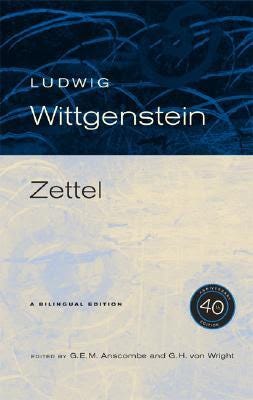"Zettel" by Ludwig Wittgenstein Edited by G.E.M. Anscombe & G.H. von Wright (University of California Press)
Zettel by Ludwig Wittgenstein is a collection of short writings put in a filing cabinet by the author and later collected by G.E.M. Anscombe and G.H. von Wright. Wittgenstein is the most challenging yet enjoyable read for me. As a writer, I often think of him as a role model. The way he looks at the world is unique, and his thinking of what an image is and what the thought of that image has a profound effect on me. And again, I may have misread him and made my version of Wittgenstein!
I usually re-read his pocket-size statements or observations twice. But in the long run, it's good to read him straight through and not worry about getting 'it' on the first try. He's a philosopher, and it's best to meditate on his words and the meaning of his sentences through your own dear time. "The limitlessness of the visual field is clearest when we are seeing nothing in complete darkness." That statement stays in my mind the most because I find myself writing in a state of mind that is very much a dark void. I then fill that space with words usually connected to something visual or sensual about an object.
Wittgenstein only wrote a little. Some of his 'literature' is from his lectures in class. I assume that this book is him working through his philosophy/thoughts. Another reason I love Wittgenstein's work so much is because it's not about the answer but the journey. He focuses on the senses and how they communicate with our brains. His writing is not scientific but almost poetry. I look at him as a poet more than anything else.


Zettel is an exceptional accumulation of insights for sure, definitely a poet of the metaphysical realm.